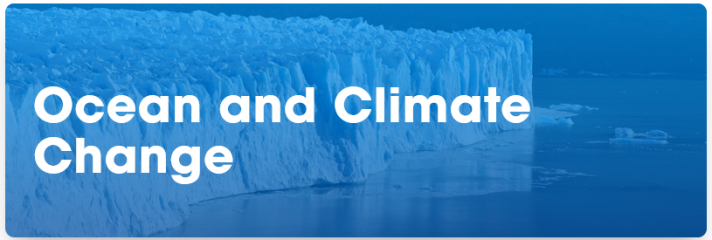Summary
Climate change is a direct threat to life in oceans – and to humanity in the long term. It poses a risk to marine food sources and biodiversity, as well as directly threatens coastal communities through sea level rise. Yet the ocean also can provide climate change adaptation and mitigation measures. New approaches are needed that:
- Increase the ocean’s potential as a carbon sink in a sustainable way;
- Increase clean energy production in/on/from the ocean;
- Manage the impacts of sea level rise;
- Increase public awareness and influence climate policy.
Problem Description
While the world’s oceans are seriously threatened by climate change, they can also provide important adaptation and mitigation measures to climate change. For one, oceans absorb around a quarter of the CO2 released into the atmosphere. While it may be useful to stimulate CO2 sequestration by the marine environment in a targeted way, the CO2 absorption process is causing a rapid rise in seawater acidity that is threatening marine biodiversity and in the longer term, human prosperity.
Ocean acidification can only be stopped by addressing the source and reducing carbon emissions, an important part of which are created through the unsustainable production of energy. Again, the oceans can provide alternatives through ocean-based clean energy infrastructure. While there has been huge investment in offshore wind power, there is still a tremendous amount of untapped atmospheric, tidal and thermic energy in and above the oceans.
Finally, sea level rise is putting coastal communities around the world at risk (recent research estimates that land that is currently home to 300 million people will flood at least once a year by 2050 unless carbon emissions are cut significantly and coastal defences strengthened[1]). As such, it is essential that we find ways to manage the impact of sea level rise.
[1] Kulp, S.A., Strauss, B.H. New elevation data triple estimates of global vulnerability to sea-level rise and coastal flooding. Nat Commun 10, 4844 (2019). https://doi.org/10.1038/s41467-019-12808-z
HOW WE MIGHT (HMW) Questions
Increase the ocean’s potential as a carbon sink in a sustainable way
► HMW ramp up natural CO2 sequestration by the marine environment, for example through protection and enhancement of marine vegetation, or through restoration of wetland and other coastal ecosystems?
► HMW identify organisms that can sequester maximum CO2 and be engineered to do so more?
Increase clean energy production in/on/from the ocean
► HMW scale up ocean energy production in a synergistic way with the environment and other maritime activities (e.g. promoting collaboration between different industries, ocean energy production, coastal protection, fisheries and aquaculture)?
► HMW integrate one or two maritime activities with ocean energy production (e.g. off-shore wind turbines and aquaculture)?
► HMW harness the increased energy in the ocean-atmospheric system (e.g. storms) to produce clean energy solutions?
Increase public awareness and influence climate policy
► HMW better communicate the impact of climate change on our oceans to the wider public in order to influence behaviour and policy making?
► HMW better communicate/visualise the impact of an ocean under stress and thereby mobilise the public and policy makers?

